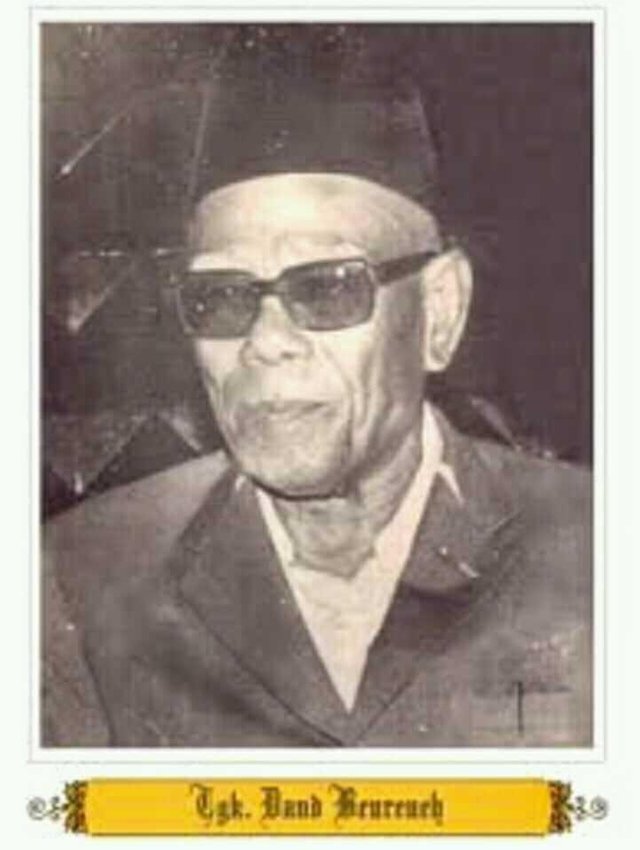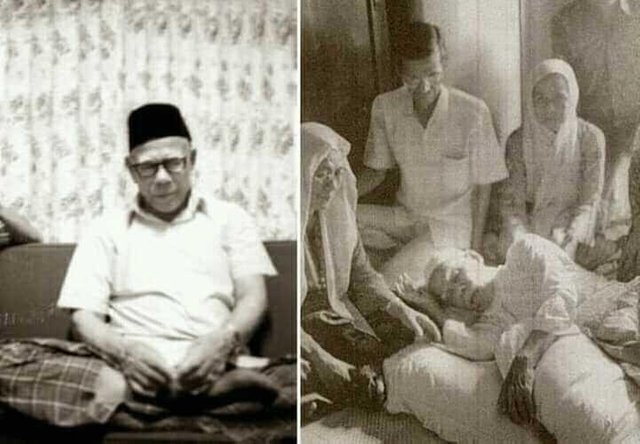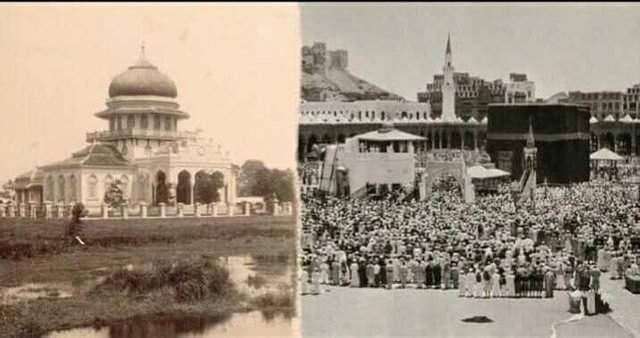STORY AND BIOGRAPHY ABU DAUD BEUREUEH PANGLIMA ACEH

Luxury House Located in a street in Tomang area, West Jakarta. The fence is white with iron gates that always close. The courtyard is spacious with flowers that bloom. In the living room was a large television, but rarely lit, accompanied by a transistor radio. Like a big grave, the house was silent day and night.
The inhabitant is a lonely elderly man. He is Teungku Daud Beureueh, the legendary figure of Aceh's independence movement. Abu Daud, as he was commonly called, was "kept" in the building from 1978 to 1982. David was an Indonesian freedom fighter.
He was once the Governor of Aceh. But he then felt disepelekan Jakarta, when his birthplace was merged with North Sumatra in 1953, in the period of Prime Minister Mohammad Natsir. The merger ruthlessly dismissed the Teungku from his post-something that not only deeply insulted Daud Beureueh, but also hurt most Acehnese.
And the wound is gaping when the people consider the top officials of the Indonesian National Army who served in Aceh at that time left-leaned. Republic also increasingly feels away from the Veranda of Mecca.
For Daud Beureueh, all these disappointments have only one way out: Merdeka. Therefore, after he was no longer governor, from Banda Aceh he returned to Kampung Usi, Beureunen Sub-district, about 15 kilometers from Sigli, the capital of Pidie District.
Soon he had gathered strength, then led a guerrilla fight against the Indonesian soldiers. Nine years old he was fighting heavily in the woods, but the "way out" was never trampled. Tired of fighting, in 1962 he then accepted the peace offer of the Indonesian government, and went down the mountain that same year.
In return, Jakarta promised to enforce Islamic law in Aceh. From the mountain he returned to the village, and settled in a cubicle next to the mosque in his village. Being a priest there, the influence of Daud Beureueh increasingly penetrated into the hearts of the people.
Professor Nazaruddin Sjamsuddin, a political scholar who once wrote the book The Republicans' Rebellion: The Darul Islam case, has a story of how the people greatly honor the charismatic figure.
On July 7, 1973, Nazaruddin interviewed Daud Beureueh for the sake of his studies. As fun as they were talking, a farmer was riding a bicycle. He just came home from the garden. He stopped for a moment, just to kiss Teungku's hand, then gave him six cucumber seeds he had just picked.

Almost every day Nazaruddin see the scene. There are people who come bring food and fruit to the house. But the various approaches and gifts from Jakarta always ditampiknya.
The peace agreement never melts its violent stance against the central government. Abu Daud was disappointed. The promise of Islamic Shari'a was never fulfilled. The lure was only realized 43 years later, through the Law of Nanggroe Aceh Darussalam (NAD), passed in 2002, 16 years after Daud Beureueh died.
It was this disappointment that he repeated in his lectures at mosques in Aceh and Medan.
Ahmad Farhan Hamid, son of Abdul Hamid, a friend of Daud Beureueh's comrade, has an interesting story about this. In 1976, while a student at the Faculty of Mathematics, University of North Sumatra, Farhan had invited Daud Beureueh to lecture on campus. Originally just asked to give a religious sermon, uh, Abu Daud instead went deep into the political area.
"He also cursed the government," Farhan said.
Indeed, in each of his lectures, Abu Daud relentlessly criticized government policy. He felt that development in Aceh could never serve the needs of the people. He witnessed how on their own land, the Acehnese only became spectators when the New Order built large industries there.
In the 1970s, for example, in North Aceh Arun gas plant was established. But the industrial machinery that roar quickly only makes the people of Aceh increasingly left behind. Inevitably, the chasm gave birth to new resistance against Jakarta under the leadership of Teungku Muhammad Hasan Tiro.
Hasan Tiro, well understood that David Beureueh's blessing is very important to sustain his movement. That is why, after returning from the United States, twice he visited Abu Abu's house to ask for support.
According to Nazaruddin Sjamsuddin, as once told by Daud Beureueh to him, Hasan Tiro met the Teungku in late 1975, at his home in Beureunuen, Aceh.
A special team was then sent to Aceh to bring Daud Beureueh to Jakarta, on May 1, 1978.
Led by Sjafrie Sjamsoeddin-Head of the Information Service of the TNI-the messengers arrived at Abu Daud's residence shortly after the morning prayers.
Narrated Nur Ibrahimy, Daud Beureueh's son-in-law, Sjafrie's team requested the Teungku's willingness to join them to Jakarta.
"We were ordered to bring Abu Daud to Jakarta to be a witness in the Surabaya District Court in the case of Haji Ismail who was accused of involvement in Komando Jihad," said one member of the group.
This event was witnessed directly Teungku Nya'Aisah, third wife of Daud Beureueh. Being old, sickly too, Daud Beureueh objected to being taken to the Republican capital.
He politely replied, "Sorry, not unwilling, I am already old. I want to testify here. "But Sjafrie's team insisted.
Still according to Nur Ibrahimy, they then hold the feet and hands of David Beureueh. One of them swiftly inject anesthetic. But, because the Teungku is violently rebelling, the syringe is broken
"Blood splashed and wet the clothes of Abu Daud," said Nur.
Daud Beureueh who had fallen limp and then rushed with a jeep to the helicopter that has been alerted. He was taken to Medan, then to Jakarta.
According to Nur Ibrahimy, the reason to be a witness in the Komando Jihad case is just a pretext to bring Forced Abu Daud out of the land of Aceh. Sjafrie Sjamsoeddin admits that it was he who led the team to "take" Daud Beureueh.
"Yes, we picked him up," he said. But, according to Sjafrie's version, at that time Abu Daud did not have time to fight, nor was there any violence, because the injected drugs quickly worked.
General of the former Commander of the Regional Military Command (Kodam Jaya) said that the appointment of the charismatic leader of Aceh was based on concerns that Daud Beureueh would return to the mountain to support the Free Aceh Movement (GAM), which Hasan Tiro was fiercely inflammatory.
At that time Hasan Tiro guerrilla resistance has indeed penetrated some people of Aceh. From the forest, they are aggressively attacking a number of government facilities and foreign companies operating in Aceh.
In early 1978, for example, Tiro's forces even broke into the Arun LNG plant in North Aceh. The attack killed an American worker. However, in the eyes of Nur Ibrahimy, the central government's fear is too much.
According to him, Abu Daud never fully approved Hasan Tiro's independence movement. The reason is, "GAM is secular and though less Islamic."
In Jakarta, originally Daud Beureueh stayed at his son-in-law's house, Muhammadiyah Haji, on Jalan Tomang, West Jakarta. But not long afterwards the government then contracted a house, just beside the son-in-law's residence. The building is big, majestic, but quiet. It was then that Abu Daud had to settle alone. The need he ate was taken care of by his son and son-in-law.
"Every day my wife and I bring food to his home," said Nur recalled. Opor chicken and ilieh aka fried eel ala Aceh is a favorite food Teungku Daud.
Fortunately, there is still a comforting heart. Daud Beureueh always beamed when the Acehnese in Jakarta came to visit him. Or also when he lectured in the mosque and attended the discussion, although in a very limited scope. In Jakarta, the space of Daud Beureueh is clearly no longer free. The security apparatus kept on eyeing him. The government is worried, who knows among the guests infiltrated an Acehnese guerrillas.
According to Nur Ibrahimy, the intelligence officers, both from the police and military, every day overseeing the rented house in Tomang, are also strictly stalking wherever Daud Beureueh steps. For this reason, Abu Daud himself referred to his magnificent residence in Tomang as "the golden cage of the Indonesian government".
Constrained so, over time also eroded the health of Daud Beureueh. Several times he fell ill, undermined by diabetes and wet lungs. Many times he asked to go back to Aceh. But it was not until 1982, when his health continued to deteriorate, the government granted it.
In Aceh, he again occupied a booth next to the mosque in his native village. But the pain is getting worse. In 1985, he fell off the bed. The hip hinge was seriously injured, and he could no longer stand up. Nevertheless, his spirit never faded.
In a state always lying in bed he still receives guests from various circles: government officials, students who are preparing a thesis, or a farmer who just wants to kiss his hand.
His critical attitude toward the central government was not melted. Time and again he sent a letter to President Soeharto, reminding the growing moral decline in the Veranda of Mecca. He just gave up when death came to pick up

Wednesday, June 10, 1987, Abu Daud closed his eyes, at the age of 89 years. From Jakarta, President Soeharto sent a special wreath of flowers and wire. The Teungku Daud Beureueh body, together with all of its dreams about the future of Aceh, is buried under a mango tree in the grounds of the Baitul A'la lil Mujahideen Mosque in Beureunuen, as he requested.
I think your rank is good, I follow you, because, I see you are very enthusiastic, I hope to follow your step.
Oce... Thanks very much... You have follow me...
Tggl tuk dikenal
Emg ud kita kenal kok... Namanya saja...
I reply and upvote your post, i like id, thank
Suka untuk tank ya...Hahaha